U.S. President Donald Trump surprised the press on Tuesday with a series of high-impact announcements on foreign and defense policy.
During a meeting in the Oval Office, the president revealed that U.S. forces had carried out an attack in the southern Caribbean Sea against a vessel he said was transporting drugs from Venezuela, which he attributed to the Tren de Aragua. The Republican president also said that"11 narco-terrorists" were killed in the operation.
The attack resulted in the deaths of 11 terrorists in combat. No members of the U.S. forces were injured.
"When you leave this room, you'll see that just a few minutes ago, we literally shot up a drug ship," Trump told reporters. He added that there was"a large amount of drugs" on the ship, though he offered few details about the military operation.
The announcement was quickly backed by Secretary of State Marco Rubio, who in a message posted on X (formerly Twitter) stated that the vessel was operated by a “US-designated narco-terrorist organization.”
Rubio called the action a"lethal blow" in Washington's campaign to confront Latin American cartels, which the government says are using maritime routes near Venezuela to traffic cocaine to the United States.
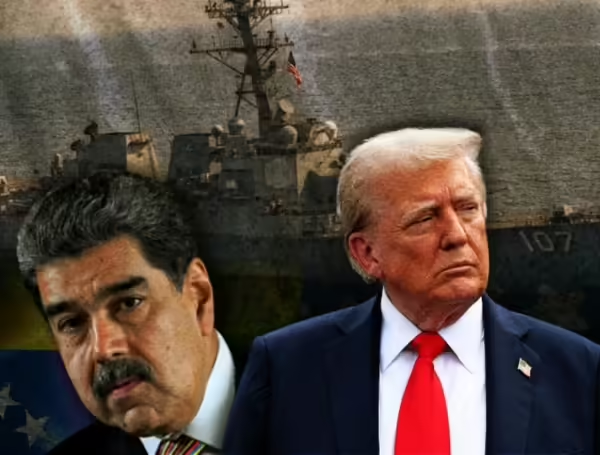
Shortly after the press conference, Trump posted a message on social media in which he said:"Early this morning, pursuant to my orders, United States Military Forces conducted an attack against positively identified Tren de Aragua narco-terrorists in the SOUTHCOM area of responsibility (...). The attack resulted in the deaths of 11 terrorists in action. No U.S. military personnel were injured."
Based on the video Trump shared on social media, it appears to be a speedboat or other similar vessel, typically used by drug cartels to transport drugs.
While the blow does not appear to be major, Trump's announcement of the direct destruction of a vessel allegedly loaded with drugs immediately raised questions among analysts and maritime security experts.
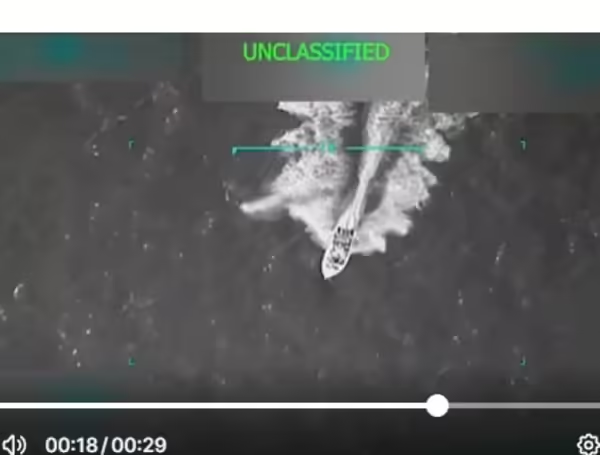
What message does Donald Trump want to send with this attack in the Caribbean Sea?
The usual practice in anti-drug operations is to intercept speedboats at sea, detain their occupants, and confiscate the cargo, which they will later present as evidence in legal proceedings. The act of"shooting at a boat" without reports of arrests or detailed seizures of the drugs is unusual and, if confirmed, would mark a change in approach with important legal and diplomatic implications.
In fact, experts point out that the United States has built a large part of its strategy to combat maritime drug trafficking around the collection of evidence and judicial cooperation with producer or transit countries. Denying these arrests and the recovered cargo changes the operational value of the mission and raises doubts about whether the primary objective was truly to disrupt a drug trafficking route, send a political message, or deter drug cartels.
https://t.co/o5xOQ6HRFg
— Marco Rubio (@marcorubio) September 2, 2025
Furthermore, the use of lethal force in international waters raises a legal debate about compliance with maritime conventions and the proportionality of the military response. In previous situations, the U.S. Coast Guard and Navy have almost always opted for pursuit, boarding, and capture maneuvers rather than sinking vessels.
Additionally, the attack comes at a very particular time.
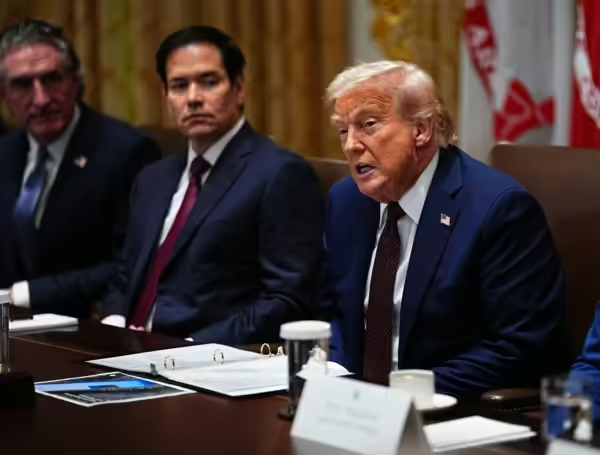
A few weeks ago, the White House unveiled plans to strengthen its maritime presence in Caribbean waters, with particular emphasis on the area off the Venezuelan coast. This involves a significant deployment of warships, reconnaissance aircraft, and thousands of troops, under the guise of combating threats from transnational criminal organizations.
At the same time, the Republican administration has stepped up its stance against Venezuelan President Nicolás Maduro, increasing the reward for his capture to $50 million and classifying him as the head of the Cartel of the Suns, a drug trafficking organization designated by the United States as a terrorist. This, coupled with the military deployment, has sparked speculation about whether Washington's ultimate objective goes beyond the fight against drug trafficking and has targeted the Venezuelan president.
What Venezuelans are saying about the US designations and the deployment in the Caribbean
In Caracas, the reaction was swift. Maduro denounced Washington's attempt to construct a"false narrative" surrounding drug trafficking to justify an operation that, in his view, aims to overthrow him.
The Venezuelan president ordered the deployment of troops along the coast and reinforced surveillance on the border with Colombia. He also urged the population to join the Bolivarian civil militia to"defend national sovereignty against imperial threats."
The tension is part of a long-standing dispute between Washington and Caracas that has been going on for more than a decade, but has intensified since Trump's return to the White House in January.
The latest episode in the Caribbean not only increases pressure on Maduro, but also heightens fears of a military escalation in the region.
The other big announcement Donald Trump made at his press conference
Despite the bombast of Venezuela's announcement and its potential future implications, Trump's media appearance had another important objective for the country's defense structure: the relocation of the United States Space Command from Colorado to Alabama.
The measure, he explained, seeks to strengthen the nation's strategic capabilities in a context of growing military competition with powers such as China and Russia.
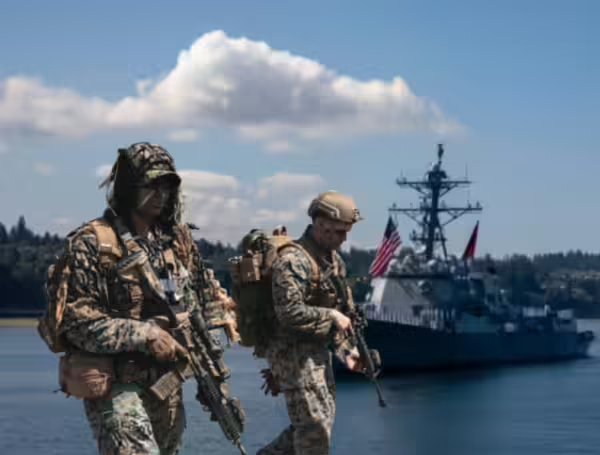
"Alabama will offer optimal conditions for our space operations, with first-class facilities and a supportive environment for our men and women in uniform," the president said.
The change of headquarters has been the subject of debate in recent months, as various states competed to establish a command post that involves millions of dollars in federal investment, thousands of direct jobs, and the possibility of becoming the nerve center of one of the Pentagon's most technologically advanced areas.
With this decision, Alabama consolidates its role as a key military enclave, adding Space Command to its already extensive network of defense-related bases and research centers.
Likewise, it's a blow to Colorado, a Democratic-leaning state, which former President Joe Biden had previously assigned to host Space Command.
The contrast between the two announcements—a naval operation in the Caribbean against a drug-laden boat and the relocation of the Command—reflects the breadth of the fronts on which Trump seeks to demonstrate leadership.
On the international level, he is attempting to project firmness against adversarial regimes like Maduro's, while sending a message to drug cartels about his government's determination to attack their trafficking routes.
Domestically, the relocation of the military command to Alabama represents a strong industrial and strategic policy, with which Trump seeks to reinforce his rhetoric of national defense and job creation.
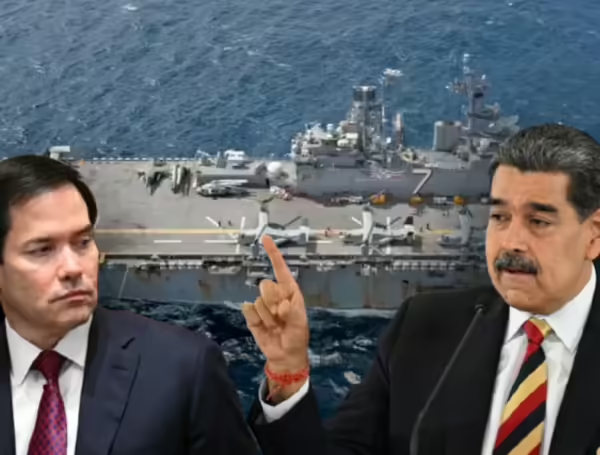
Trump's appearance before the media was also viewed from another perspective. On the one hand, it was seen as a way to counterbalance recent international meetings between other powers such as Russia, China, India, and North Korea, which seek to project a common agenda that contrasts with Washington's interests in the region.
At the same time, the staging allowed the president to dispel rumors about his health that had circulated in recent days and to appear active in leading national security and military policy decisions.

